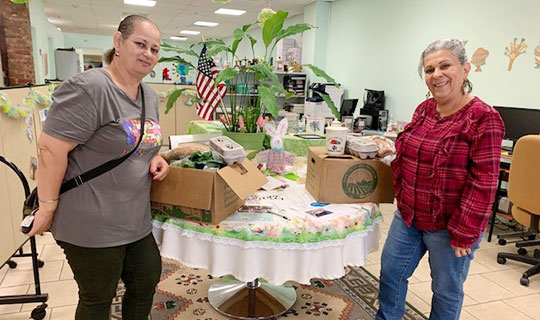 On April 13, 2022, Josephine’s Place, an Elizabeth-based drop-in space dedicated to providing women with safety, growth, and opportunities for empowerment, received Common Market fresh food boxes delivered through a partnership with Trinitas Regional Medical Center, an RWJBarnabas Health facility.
On April 13, 2022, Josephine’s Place, an Elizabeth-based drop-in space dedicated to providing women with safety, growth, and opportunities for empowerment, received Common Market fresh food boxes delivered through a partnership with Trinitas Regional Medical Center, an RWJBarnabas Health facility.
RWJBarnabas Health, the largest academic health care system in New Jersey is partnering with The Common Market to address food insecurity in 18 towns across the state from Jersey City to Toms River.
The partnership began following the pandemic. In 2020, because of disruptions to local food supply chains, RWJBarnabas Health watched as their long-standing community partners — local churches, and food pantries — ran out of food for families in need.
Through the RWJBH Social Impact and Community Investment Practice, a program developed to address food insecurity, employment, housing, and many other social determinants of health; RWJBH found new ways to connect communities in need with farm fresh food staples.
In 2021, RWJBH partnered with the Common Market to deliver Farm-Fresh Boxes of local produce, freshly baked bread, eggs, and yogurt, to RWJBH Hospitals across the state, which intern delivered the boxes to local food distribution sites, such as churches and food pantries.
RWJBH hospitals serve as bridges from Farms to Hospitals to Tables. This partnership is supporting eight family farms and has distributed 3,470 Farm-Fresh Boxes, the equivalent of 54,800 pounds of food and 65,760 healthy meals.
RWJBH is continuing this partnership in 2022 with deliveries scheduled throughout the year.
“This farm-to-table model creates viable markets for farmers, while increasing access to healthy foods for patients, staff, and local community members who are living in food deserts with no access to healthy foods,” said Barbara Mintz, Senior Vice President, Social Impact and Community Investment, RWJBarnabas Health.
These communities struggle with obesity and its related conditions such as heart disease, stroke, type 2 diabetes, and certain types of cancer, all of which are among the leading causes of preventable, premature death.
Four out of ten adults living in the U.S. are struggling with obesity putting them at risk for related conditions including heart disease, stroke, type 2 diabetes and certain types of cancer, all of which are among the leading causes of preventable, premature death.
While obesity has a widespread impact nationwide, it disproportionately affects those who live in food deserts, or areas that are usually low-income with limited access to affordable and nutritious food. Lack of access to fresh, nutritious food can lead not only to obesity and weight challenges but can also result in hunger and malnutrition as the food choices available lack vital nutrients.
For more information, visit Social Impact and Community Investment.